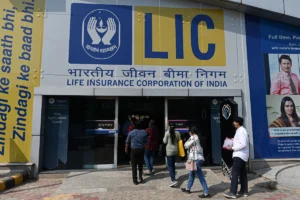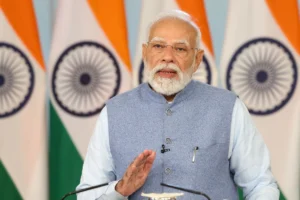
As the nation celebrates Diwali, the Indian stock market experienced a lackluster opening on Thursday, reflecting mixed sentiments among investors.
Despite the festive atmosphere, the market faced selling pressure in several key sectors, including automobiles, IT, public sector banks, and fast-moving consumer goods (FMCG).
At the opening bell, the BSE Sensex stood at 79,800.49, down by 141.69 points or 0.18%. The Nifty index mirrored this trend, trading at 24,311.10 after a dip of 29.75 points or 0.12%.
Market dynamics appeared somewhat optimistic overall, with the National Stock Exchange (NSE) reporting 1,030 stocks in the green compared to 613 in the red.
However, analysts noted significant declines in certain indices, while the Nifty Bank index rose slightly to 51,844.45, increasing by 36.95 points or 0.07%.
Conversely, the Nifty Midcap 100 index fell to 56,167.45, down 171.80 points or 0.30%, and the Nifty Smallcap 100 index decreased to 18,359.60, slipping 31.30 points or 0.14%.
Among the top performers in the Sensex pack were L&T, Sun Pharma, Axis Bank, Hindustan Unilever, JSW Steel, and Nestle India, which saw gains. In contrast, the tech sector struggled, with Tech Mahindra, Infosys, TCS, HCL Tech, Titan, and Maruti emerging as the biggest losers.
In the broader Asian markets, most exchanges, including those in Bangkok, Hong Kong, Shanghai, and Jakarta, showed positive momentum, although Tokyo and Seoul lagged. Meanwhile, US markets closed lower in their previous trading session, reflecting a global caution.
Analysts Predict Limited Market Fireworks This Diwali
Market analysts suggest that this Diwali may not bring the anticipated market fireworks.
October has been particularly challenging for India, with the Nifty down 5.7% while markets in the US and Japan recorded positive gains, and China and Hong Kong experienced significant outperformance.
This trend of underperformance in the Indian market has been attributed to ongoing selling pressure from foreign institutional investors (FIIs) and growing concerns regarding slowing earnings growth.
Experts believe that this situation is unlikely to change in the near term, although they anticipate some minor recoveries could occur.
Earlier on 30 October, FIIs sold equities worth Rs 4,613 crore, while domestic institutional investors (DIIs) offset some of this selling by purchasing equities worth Rs 4,518 crore.
This divergence highlights the ongoing tug-of-war between foreign and domestic investment dynamics in the market.
Also Read: India Aims For 30% EV Penetration By 2030; Boosts Production & Supply Chains: S&P Global Ratings
To read more such news, download Bharat Express news apps




















